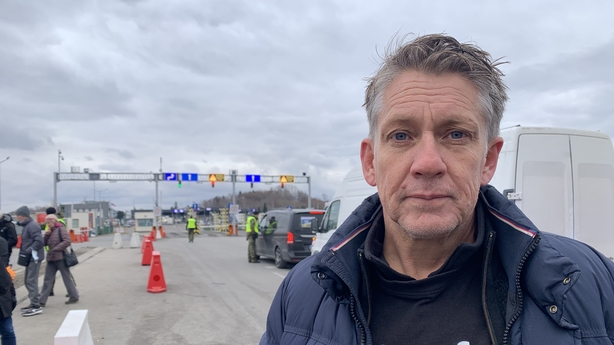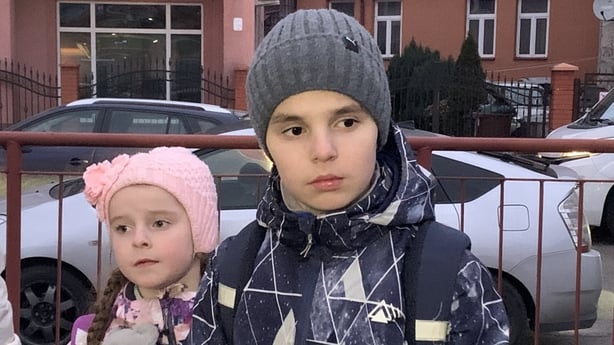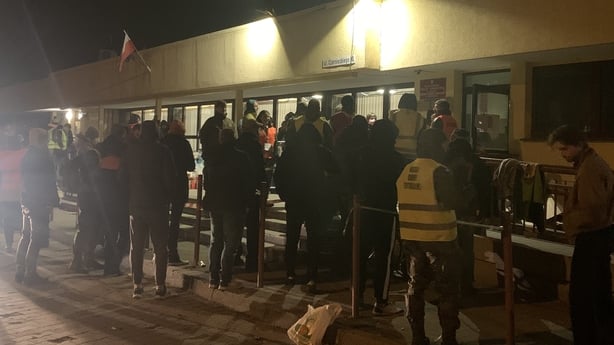Rats.
The very word gives people the heebie jeebies.
The idea that kids in Ukraine are having to choose between living with rats in a cellar, or face being killed above ground, is nearly beyond comprehension.
Yet that's the bleak reality according to James Elder, who works in the beautiful old city of Lviv, in western Ukraine, with the UN’s children’s agency UNICEF.
I met the Australian UNICEF spokesperson on a bitterly cold afternoon at Medyka yesterday, on the Polish side of its border crossing with Ukraine.
He related a story to me about a nine-year-old girl who expressed her concern to him that rats had infested their underground shelter. Her mother intervened in their conversation and said "... but there are no bombs down here."

What a choice - rats or bombs.
James said, with total conviction, that it was "utterly horrendous" that such a grim choice was being foisted upon Ukraine’s children and young people, as a result of Russia’s invasion.
He said bluntly: "They’re traumatised. They see the fear of their parents. They hear the bombs. They’re short of water. They’re short of heat… it’s no place for anyone. It’s definitely no place for a child."
That’s true. But it is the horrendous reality for many children in Ukraine.
I met some of them last night as they fled Lviv via train and landed, bewildered, in the southeastern Polish border town of Przemysl.
The first family I encountered was Ukrainian woman, Olana, with her six-year-old daughter Ela and 11-year-old son Artur. Olana had tears in her eyes before I’d even asked a question.

She told me they’d escaped the Ukrainian capital Kyiv, after spending six days in a bunker close to their house, but her children just wanted things to go back to the way they had once been.
Olana said: "The children are scared and terrified. They’re constantly asking to go home… to go back to their own schools and be at their desks and continue studying."
I asked her, given things were unlikely to change anytime soon, what she told her kids.
She said, with a tremor in her voice which belied what she was saying: "I’m explaining to them that this is only a temporary thing. It’s a temporary trip and very soon we’ll be back home where their Dad is waiting for us."
The second family was unusual in that the father, Vasyl, was accompanying his wife and their children, Shakr, who was five years old, and Vika, aged just three.
He teared-up within seconds as he began to tell me of their traumatic escape from the eastern Ukrainian city of Kharkiv, which has been severely damaged in the Russian onslaught. They saw bodies lying on the footpaths and roadsides along their journey to escape.
By the time they finally made it to the city’s train station, they were in desperation: "The children were extremely scared. They were shaking. Especially this moment when they’d to go through the crowd at the train station… people were in real chaos. People just tried to grab their children and push them forward to make it more quickly out of the town."

As we spoke, in the glow of the TV camera’s light , little Vika smiled up at us sweetly. I asked Vasyl how she was doing. He said: "She doesn’t understand the severity of the situation. It is extremely hard for their psychological well-being."
Reflecting as a parent, on the events in the Kharkiv railway station, he said: "You really do not know what to do at that moment. We just wanted to make them safe but realised it just wasn't possible anymore."
Within a few feet of Vasyl and his family, I met eight-year-old Masha who explained to me what it was like to live under bombardment.
"It happened that the cars with the big bombs came to Ukraine. I wasn’t the first to see it. My Mama saw it first and then she told me that the bomb cars came. That’s why we are here right now."
Masha’s mother Alina said, with an air of distress, that they’d left her youngest daughter, cousin and older family members behind. It was a decision which cut her to the bone.
Alina said her elderly relatives implored her: "We have lived our lives. But you are young. You must try to escape."
Their pathway to freedom involved a three-day rail trek across the country and 15 hours at Lviv train station. But they’d made it over the border into Poland.
Alina told me: "It was extremely difficult to leave our own house. It was just that we were forced out… we are very happy that we made it."
She felt that the children’s witnessing of war had "caused a lot of damage" - especially seeing the Russian warplanes flying over. However, she was relieved that Masha and her seven-year-old brother Kiril hadn’t witnessed any attacks or seen dead people on the streets.
The fourth family I met had different circumstance again - the mother, Yulia, was being reunited in Poland with her children and the monumental relief was etched upon her face.
They’d all escaped from Ukraine's second city, Kharkiv - and Yulia’s crystal-clear view was that the entire family had experienced "terror,"
She told me: "I do not understand who has to heal the children - to fix this. I really do not understand the consequences. I’ve just received them so I do not know, say, how they will sleep."
I asked her son, who was four or maybe five, what had it been like in Kharkiv and he told me: "I was really scared." I asked him what he’d been most scared of, and he replied: "Being at home. It was just - boom - explosions."
His sister piped-up: "We just stayed in the bomb shelter… in the bomb shelter, there was shooting!"
I didn’t get the chance to find out the children’s names as their mother said a lift had arrived and they sprinted off into the night.
Nonetheless, the grotesque subversion of reality, in which a home becomes a place of terror, is undoubtedly going to have massive consequences for Ukraine’s young citizens.
UNICEF’s James Elder tried to explain it this way - the horror of a child’s life in Ukraine: "There’s no school. Today’s lesson is: an air-raid siren means jump out of that bed and head to that bunker."
The most horrendous aspect of all this is that it could get worse still, with the Polish government warning of an "unimaginable" humanitarian situation developing should Russia continue to prosecute this war.
The planning for such a nightmare scenario is already under way. We know that because James Elder was speaking with paediatricians who are drawing-up triage plans for what should happen in the event of mass casualties.
"I asked: What type of surgery are you planning for? He said: Yeah, we’re planning for a warzone. What does that look like? And he said: if we get large numbers of children, we have to prioritise.
He told me: A green sticker means that kid is okay; a yellow sticker means we need urgent attention; if we put a black sticker on it, the child - they’re not going to make it."







